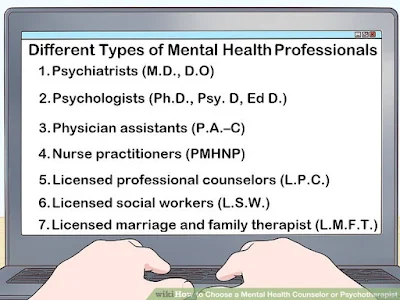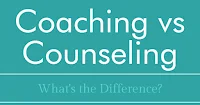Today's Blog Post
The purpose of this post is to help client-consumers understand the significant differences between counselors and coaches.
Years ago, most people did not seek counseling -- it was not culturally acceptable. If you had problems, you talked to a friend, family, or priest. If that did not work, you met with a psychologist or psychiatrist. Now days, it seems you have unlimited options, including those posted in the photo to the right. Choices are plenty and now life coaches seem to be getting into the counseling-therapy profession.
What are the differences?
⇾ Typically, coaching does not require an undergraduate or advance degree, such as master or doctorate.
⇾ Coaching programs are not regulated/accredited, nor do they require minimum academic entrance standards such as 3.0 GPA or GRE graduate level acceptance exams.
⇾ Coaching programs may not conduct state and federal criminal background checks on their employees or students.
⇾ To be a counselor, you must graduate from a 4-year college, and hold a masters or doctorate degree from an accredited institution. To be accepted into a master level program, you must have minimum 3.0 GPA, submit GREs and other applications requirements, including state and federal criminal background checks.
⇾ To graduate from a master level program, you must take 60 credit hours and maintain a minimum 3.0 GPA. Further, you must pass the Counselor Preparation Comprehensive Exam (CPCE). Last, you must complete up to 1,000 hours of supervised clinical internships.
⇾ To graduate with a doctorate degree (PhD), you must have a graduate level degree from an accredited institution. You must also complete a 60 credit hour program, including 1,000 hours of clinical supervision. Lastly, you must defended your thesis/dissertation.
⇾ To be licensed and/or registered counselor in any US state, you must have a master or doctorate degree, pass state and national board exams. Post degree, you must complete 1000 clinical-client supervision hours for PhD and PsyD degree only, and up to 3000 clinical-client supervision hours for master level degree.
Unfortunately, it appears there is a massive wave of 'life coaches' making far reaching claims (e.g.,coaches are the same as counselors; coaching is the same as counseling/therapy). No matter how you qualify life coaches and/or coaching, it's NOT TRUE.
For example: If a life coach offers or engages in professional counseling services without holding academic credentials or a state license, it is unethical and illegal.
For the record, we offer coaching-consulting services, so we are not saying coaching is bad -- just highly different and unregulated.
More information about our coaching-consulting services, read Coaching-Consulting
The purpose of this post is to help client-consumers understand the significant differences between counselors and coaches.
Years ago, most people did not seek counseling -- it was not culturally acceptable. If you had problems, you talked to a friend, family, or priest. If that did not work, you met with a psychologist or psychiatrist. Now days, it seems you have unlimited options, including those posted in the photo to the right. Choices are plenty and now life coaches seem to be getting into the counseling-therapy profession.
What are the differences?
⇾ Typically, coaching does not require an undergraduate or advance degree, such as master or doctorate.
⇾ Coaching programs are not regulated/accredited, nor do they require minimum academic entrance standards such as 3.0 GPA or GRE graduate level acceptance exams.
⇾ Coaching programs may not conduct state and federal criminal background checks on their employees or students.
⇾ To be a counselor, you must graduate from a 4-year college, and hold a masters or doctorate degree from an accredited institution. To be accepted into a master level program, you must have minimum 3.0 GPA, submit GREs and other applications requirements, including state and federal criminal background checks.
⇾ To graduate from a master level program, you must take 60 credit hours and maintain a minimum 3.0 GPA. Further, you must pass the Counselor Preparation Comprehensive Exam (CPCE). Last, you must complete up to 1,000 hours of supervised clinical internships.
⇾ To graduate with a doctorate degree (PhD), you must have a graduate level degree from an accredited institution. You must also complete a 60 credit hour program, including 1,000 hours of clinical supervision. Lastly, you must defended your thesis/dissertation.
⇾ To be licensed and/or registered counselor in any US state, you must have a master or doctorate degree, pass state and national board exams. Post degree, you must complete 1000 clinical-client supervision hours for PhD and PsyD degree only, and up to 3000 clinical-client supervision hours for master level degree.
Unfortunately, it appears there is a massive wave of 'life coaches' making far reaching claims (e.g.,coaches are the same as counselors; coaching is the same as counseling/therapy). No matter how you qualify life coaches and/or coaching, it's NOT TRUE.
For example: If a life coach offers or engages in professional counseling services without holding academic credentials or a state license, it is unethical and illegal.
For the record, we offer coaching-consulting services, so we are not saying coaching is bad -- just highly different and unregulated.
More information about our coaching-consulting services, read Coaching-Consulting
Please write down and place crisis/emergency information in easy to find locations. Also, enter the below phone #'s into your cell phones, including 911.
A call could save lives!
Emergency Services
Call 911 or 24 Hour Crisis Center
 |
| Contact Link |
 |
| Contact Link |


